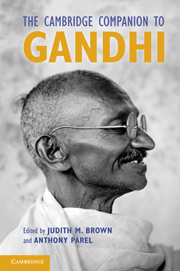Book contents
- Frontmatter
- Introduction
- Part I Gandhi: The historical life
- Part II Gandhi: Thinker and activist
- 4 Gandhi’s key writings
- 5 Gandhi’s religion and its relation to his politics
- 6 Conflict and nonviolence
- 7 Gandhi’s moral economics: The sins of wealth without work and commerce without morality
- 8 Gandhi and the state
- 9 Gandhi and social relations
- Part III. The contemporary Gandhi
- Guide to further reading
- Index
5 - Gandhi’s religion and its relation to his politics
from Part II - Gandhi: Thinker and activist
Published online by Cambridge University Press: 28 May 2011
- Frontmatter
- Introduction
- Part I Gandhi: The historical life
- Part II Gandhi: Thinker and activist
- 4 Gandhi’s key writings
- 5 Gandhi’s religion and its relation to his politics
- 6 Conflict and nonviolence
- 7 Gandhi’s moral economics: The sins of wealth without work and commerce without morality
- 8 Gandhi and the state
- 9 Gandhi and social relations
- Part III. The contemporary Gandhi
- Guide to further reading
- Index
Summary
Gandhi was a deeply – and avowedly – religious man, in particular, a Hindu. His religiosity was eclectic and individual, a product partly of what was given to him, but partly too a matter of his instincts, which were then consolidated over the years by his haphazard reading and his highly personal and searching reflection.
What was given to him was the particular kind of Vaishnavism that was pervasive in his native Gujarat, ranging from the temples to which his mother took him as a child to the Gujarati sant-poets such as Narsin Mehta and Shamal Bhat whom he read from an early age. To this, he added a great variety of elements – religious, moral, and philosophical. These included: Advaita-Vedantin ideas; Bhakti ideals of devotion (ideals through which he read his beloved Bhagavad Gita and made it, as he himself would say, his constant moral guide); the Jainism of his mentor Raychandbhai; Buddhism and an admiration for the person of the Buddha that he acquired after being moved by Edwin Arnold’s biography The Light of Asia; theosophical notions (shorn of their occultism) that he got from exposure in England to Annie Besant, and Christianity – particularly the New Testament and what he took to be the moral instruction that comes from the very life and example of its founder – which he filtered through his admiring, though selective, reading of Tolstoy’s writings, as well as what he took from his frequent encounter with missionaries both in South Africa and in India. He even made something religious out of what he learnt from his study of Ruskin and Thoreau who, like all the other influences on him, contributed to the shaping of a life of spiritual dedication and service and conscience.
- Type
- Chapter
- Information
- The Cambridge Companion to Gandhi , pp. 93 - 116Publisher: Cambridge University PressPrint publication year: 2011
- 28
- Cited by

